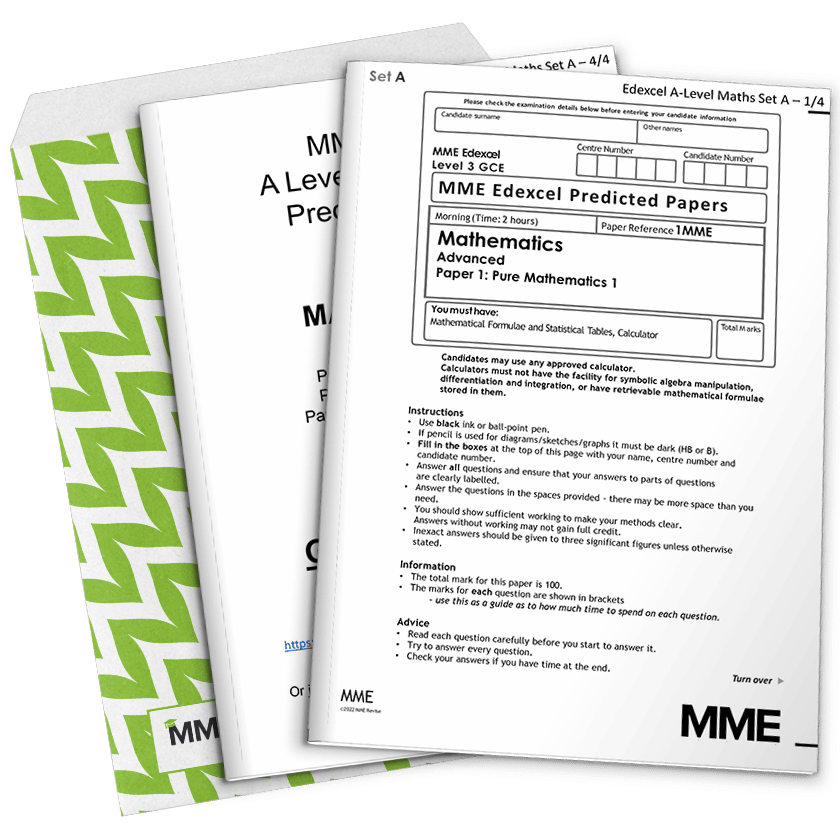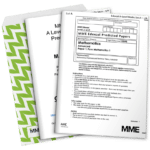Integration Involving Exponentials and Logarithms
Integration Involving Exponentials and Logarithms Revision
Integration Involving Exponentials and Logarithms
Previously we have seen that the function e^{x} is its own derivative. This also means that it is its own integral.
We have also previously seen that our rule for x^{n} does not work for n=-1. On this page we shall discover the integral of x^{-1}.
Make sure you are happy with the following topics before continuing.
Integrating the Exponential Function
The derivative of e^{x} is e^{x}. It follows that:
\int e^{x}dx=e^{x}+c
Don’t forget +c.
Indeed, more generally:
\int e^{ax+b}dx=\dfrac{1}{a}e^{ax+b}+c
Example: The integral of e^{3x+4} is \dfrac{1}{3}e^{3x+4} + c
Integrating to the Natural Logarithm
Generally, \int x^{n}dx=\dfrac{1}{n+1}x^{n+1}+c. However, when n=-1, this involves dividing by 0. So another function to integrate to must be found. This is the natural logarithm.
{\LARGE \int}\dfrac{1}{x}dx=\ln(|x|)+c
This rule also comes in two other forms:
{\LARGE \int}\dfrac{1}{ax+b}dx=\dfrac{1}{a}\ln(|ax+b|)+c
{\LARGE \int}\dfrac{f'(x)}{f(x)}dx=\ln(|f(x)|)+c
Examples: {\LARGE \int}\dfrac{1}{6-7x}dx=-\dfrac{1}{7}\ln(|6-7x|)+c
{\LARGE \int}\dfrac{3\cos(3x)}{\sin(3x)}dx=\ln(|\sin(3x)|)+c because the derivative of \sin(3x) is 3\cos(3x) so it is of the form {\LARGE \int}\dfrac{f'(x)}{f(x)}dx
Integrating Partial Fractions
To integrate partial fractions, split them into multiple terms then apply the appropriate integration rule to each term.
Example: Integrate \dfrac{5x+4}{(2x+1)(x+2)}
Step 1: split it into partial fractions.
\dfrac{5x+4}{(2x+1)(x+2)}=\dfrac{A}{2x+1}+\dfrac{B}{x+2}
5x+4=A(x+2)+B(2x+1)
5x+4=Ax+2A+2Bx+B
A+2B=5
2A+B=4
2A+4B=10
3B=6
B=2
2A+2=4
2A=2
A=1
\dfrac{5x+4}{(2x+1)(x+2)}=\dfrac{1}{2x+1}+\dfrac{2}{x+2}
Step 2: Put it into the integral.
\begin{aligned}\int\dfrac{5x+4}{(2x+1)(x+2)}dx&=\int\dfrac{1}{2x+1}+\dfrac{2}{x+2}dx\\[1.2em]&=\int\dfrac{1}{2x+1}dx+2\int\dfrac{1}{x+2}dx\end{aligned}
Step 3: Apply the rule to each term:
{\LARGE \int}\dfrac{1}{2x+1}dx=\dfrac{1}{2}\ln(|2x+1|)+c
{\LARGE \int}\dfrac{1}{x+2}dx=\ln(|x+2|)+c
Step 4: Put it all together.
{\LARGE \int}\dfrac{5x+4}{(2x+1)(x+2)}dx=\dfrac{1}{2}\ln(|2x+1|)+2\ln(|x+2|)+c
Integration Involving Exponentials and Logarithms Example Questions
Question 1: Integrate:
i) e^{2x}
ii) 3e^{5x+1}
iii) 12e^{9-28x}
[3 marks]
i)
\begin{aligned}\int e^{2x}dx=\dfrac{1}{2}e^{2x}+c\end{aligned}
ii)
\begin{aligned}\int \left( 3e^{5x+1}\right) dx&=\left( 3\times\dfrac{1}{5}e^{5x+1}\right) +c\\[1.2em]&=\dfrac{3}{5}e^{5x+1}+c\end{aligned}
iii)
\begin{aligned}\int12e^{9-28x}dx&=\left( 12\times -\dfrac{-}{28}e^{9-28x}\right) +c\\[1.2em]&=-\dfrac{12}{28}e^{9-28x}+c\\[1.2em]&=-\dfrac{3}{7}e^{9-28x}+c\end{aligned}Question 2: Integrate:
i) \dfrac{1}{3x+1}
ii) \dfrac{3}{x+4}
iii) \dfrac{-2}{6-11x}
[3 marks]
i)
\begin{aligned}\int\dfrac{1}{3x+1}dx=\dfrac{1}{3}\ln(|3x+1|)+c\end{aligned}
ii)
\begin{aligned}\int\dfrac{3}{x+4}dx&=\left( 3\times\int\dfrac{1}{x+4}\right) +c\\[1.2em]&=3\ln(|x+4|)+c\end{aligned}
iii)
\begin{aligned}\int\dfrac{-2}{6-11x}dx&=\int\dfrac{2}{11x-6}dx\\[1.2em]&=2\times\int\dfrac{1}{11x-6}dx\\[1.2em]&=\left( 2\times\dfrac{1}{11}\ln(|11x-6|)\right) +c\\[1.2em]&=\dfrac{2}{11}\ln(|11x-6|)+c\end{aligned}Question 3: Integrate:
i) \dfrac{6x+5}{3x^{2}+5x+4}
ii) \dfrac{x^{3}}{x^{4}+5}
iii) \dfrac{\cos(2x)}{\sin(x)\cos(x)}
[6 marks]
i)
\begin{aligned}\int\dfrac{6x+5}{3x^{2}+5x+4}dx&=\int\dfrac{\dfrac{d}{dx}(3x^{2}+5x+4)}{3x^{2}+5x+4}dx\\[1.2em]&=\ln(|3x^{2}+5x+4|)+c\end{aligned}
ii)
\begin{aligned}\int\dfrac{x^{3}}{x^{4}+5}dx&=\dfrac{1}{4}\int\dfrac{4x^{3}}{x^{4}+5}dx\\[1.2em]&=\dfrac{1}{4}\int\dfrac{\dfrac{d}{dx}(x^{4}+5)}{x^{4}+5}dx\\[1.2em]&=\dfrac{1}{4}\ln(|x^{4}+5|)+c\end{aligned}
iii)
\begin{aligned}&\int\dfrac{\cos(2x)}{\sin(x)\cos(x)}dx=\int\dfrac{\cos^{2}(x)-\sin^{2}(x)}{\sin(x)\cos(x)}dx\\[1.2em]&=\int\dfrac{\cos(x)\dfrac{d}{dx}(\sin(x))+\sin(x)\dfrac{d}{dx}(\cos(x))}{\sin(x)\cos(x)}dx\\[1.2em]&=\int\dfrac{\dfrac{d}{dx}(\sin(x)\cos(x))}{\sin(x)\cos(x)}dx\\[1.2em]&=\ln(|\sin(x)\cos(x)|)+c\end{aligned}Question 4: Integrate \dfrac{11x+7}{3x^{2}+7x+2}
[4 marks]
Split into partial fractions:
\begin{aligned}\dfrac{11x+7}{3x^{2}+7x+2}&=\dfrac{11x+7}{(3x+1)(x+2)}\\[1.2em]&=\dfrac{A}{3x+1}+\dfrac{B}{x+2}\end{aligned}
11x+7=A(x+2)+B(3x+1)
11x+7=Ax+2A+3Bx+B
A+3B=11
2A+B=7
2A+6B=22
5B=15
B=3
2A+3=7
2A=4
A=2
\dfrac{11x+7}{3x^{2}+7x+2}=\dfrac{2}{3x+1}+\dfrac{3}{x+2}
Now integrate:
\begin{aligned}\int\dfrac{11x+7}{3x^{2}+7x+2}dx&=\int\left( \dfrac{2}{3x+1}+\dfrac{3}{x+2}\right) dx\\[1.2em]&=\dfrac{2}{3}\ln(|3x+1|)+3\ln(|x+2|)+c\end{aligned}
Integration Involving Exponentials and Logarithms Worksheet and Example Questions
Integration
A LevelYou May Also Like...

MME Learning Portal
Online exams, practice questions and revision videos for every GCSE level 9-1 topic! No fees, no trial period, just totally free access to the UK’s best GCSE maths revision platform.






